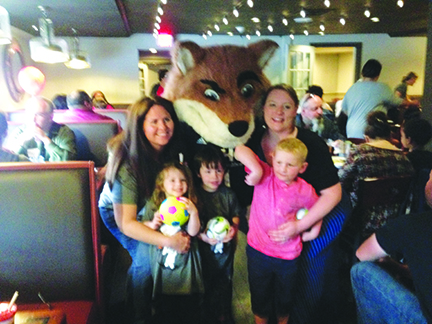If you’re a parent who’s experienced the joy of a child melting down in a public place, you may feel it’s not an experience you’re willing to repeat. For many parents with children who have autism, this experience has happened so often that they avoid taking their families out to eat, an experience many miss having. “Autism Eats” is a Massachusetts based nonprofit that aims to solve this dilemma. The group organizes autism-friendly dinners at locations throughout the state. Recently, on May 23rd, the group got together for a great dinner at Restaurant 45, in Medway. The family-friendly night, which took place right in the general restaurant area of the restaurant rather than in a banquet hall, for a feel typical of a family night out, even included a visit from New England Revolution’s mascot, Slyde.
Lenard Zohn is one of the founders of Autism Eats.
“I am an ‘autism father,’” says Zohn. “We were always a family who loved going out to dinner, being with friends, being with community, but my son Adin, who is now 12, did not share this love as much as we did. For people with autism, a restaurant can exasperate a lot of issues, with fluorescent lighting, loud music, and the kids don’t want to wait, don’t want to be seated, and there may not be any food the like. He would flop on the floor, run around or play his iPad too loudly. We got to the point where any enjoyment we had going out to dinner was (gone) due to the stress we felt.”
The Zohns, who also have a now 14-year-old daughter, started going out less and less.
“My wife, Delphine, said, ‘We’re not the only autism family out there and not the only family that misses something typical and enjoyable.’ We knew what things didn’t work (at a restaurant), and we felt if we could take what didn’t work and do the opposite and modify it, we could make what did work (for autism families).”
In February of 2013, Autism Eats held its first dinner in the Zohn’s community of Andover.
“We met in our school and told them what we were doing, and we found a local restaurant I thought would fit the bill in terms of layout and attitude of the management,” says Zohn. “We weren’t really sure how many people were going to show up. We estimated 30 people, but by the time of the event, we had 110 people join us from all over the state, some driving up to two hours each way, and they gave us the whole restaurant. And it was fantastic; everyone just had a great time, including us.”
A night out with Autism Eats will provide a nonjudgmental environment. All behaviors, says Zohn, are welcome.
“You’re amongst people and families that are all experiencing the same things. You don’t have to say anything or apologize. It’s an opportunity to relax, enjoy and meet some other people, and put the Autism on the shelf for a couple of hours.”
Zohn says autistic children who’ve attended have been calmer than he have imagined.
“There have been no real meltdowns,” he says, “Of course, kids don’t necessarily sit the whole night, but in a lot of ways, it looks typical of a whole lot of families.”
Restaurants are screened in advance to make sure they have a comfortable physical layout, and, just as important, he says, is making sure owners or managers understand what the group is trying to do. “We want them to be excited about it, to feel they have an opportunity to give back to the community and create a fun night for all of us. And we bring them business on a slow night.”
“I think it’s a wonderful organization,” says Dawn Lloyd, mother of three from Franklin who chose Restaurant 45 for the May dinner, the second one she’s organized for the group. “It can be difficult when you have a child that’s on the spectrum, particularly when you have to go into public places. They may not behave in a manner other patrons find acceptable. In my household, that may look like loud outbursts or not staying seated or keeping an appropriate volume of voice, but autism looks different for everyone. Going to an Autism Eats dinner literally feels like going to a restaurant and takes the weight off our shoulders.”
Lloyd, who has two children on the spectrum, adds, “I can breathe. I don’t have to anticipate every move they are going to make, when are they going to yell, are there going to be tomato chunks on the pizza, is it going to be stressful? And you don’t have to wait, which can literally be the hardest part.” (Autism Eats dinners are served buffet-style.)
In addition, the Zohns hand out a sensory toy at each dinner for every child, not just children on the spectrum, and children are free to get up and leave the table when they’re done, she says. “It’s really pretty awesome,” she says.
Since that first dinner, Autism Eats has held 35 dinners in 12 states.
“We’re thrilled with the success of it,” says Zohn. “We’re adding a new community and new states almost monthly.”
If you’d like to find out more about Autism Eats or attend a dinner, visit www.autismeats.org.

Issue Date:
June, 2017
Article Body:
